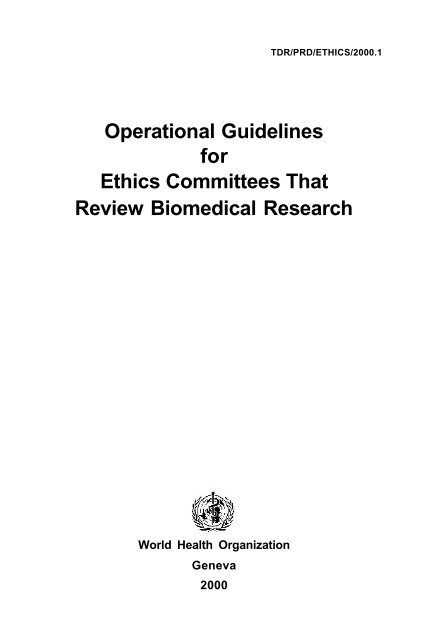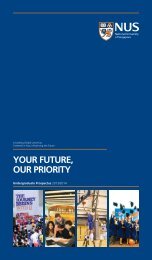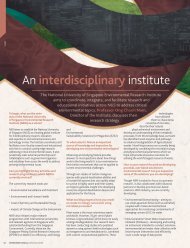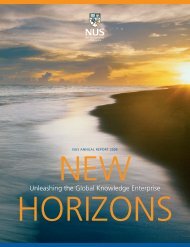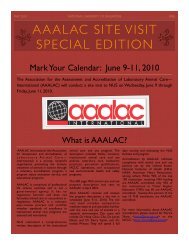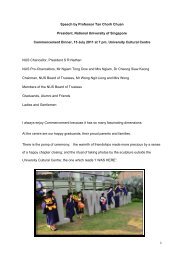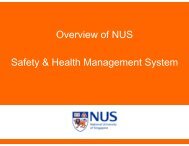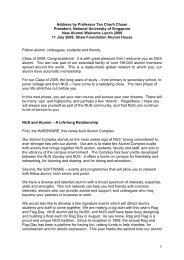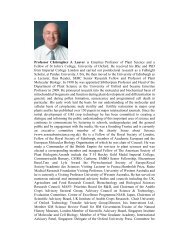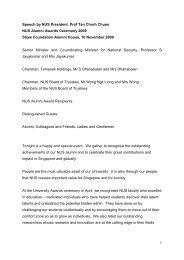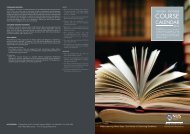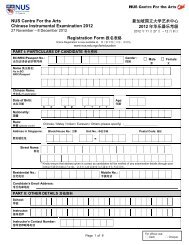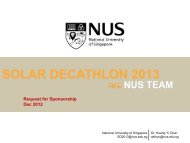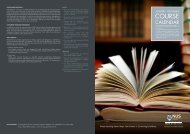Operational Guidelines for Ethics Committees That Review ...
Operational Guidelines for Ethics Committees That Review ...
Operational Guidelines for Ethics Committees That Review ...
You also want an ePaper? Increase the reach of your titles
YUMPU automatically turns print PDFs into web optimized ePapers that Google loves.
TDR/PRD/ETHICS/2000.1<br />
<strong>Operational</strong> <strong>Guidelines</strong><br />
<strong>for</strong><br />
<strong>Ethics</strong> <strong>Committees</strong> <strong>That</strong><br />
<strong>Review</strong> Biomedical Research<br />
World Health Organization<br />
Geneva<br />
2000<br />
i
This document is not issued to the general public, and all rights are<br />
reserved by the World Health Organization (WHO). The document may<br />
not be reviewed, abstracted, quoted, reproduced or translated, in part or<br />
in whole, without the prior written permission of WHO. No part of this<br />
document may be stored in a retrieval system or transmitted in any <strong>for</strong>m<br />
or by any means – electronic, mechanical or other – without the prior<br />
written permission of WHO.<br />
The views expressed in documents by named authors, are solely the<br />
responsibility of those authors.<br />
© World Health Organization 2000<br />
ii
TABLE OF CONTENTS<br />
PREFACE ...................................................................................... v<br />
1 OBJECTIVE .............................................................................1<br />
2 THE ROLE OF AN EC ..............................................................1<br />
3 ESTABLISHING A SYSTEM OF ETHICAL REVIEW ...............2<br />
4 CONSTITUTING AN EC ..........................................................2<br />
4.1 Membership Requirements............................................... 3<br />
4.2 Terms of Appointment ...................................................... 4<br />
4.3 Conditions of Appointment .............................................. 4<br />
4.4 Offices .............................................................................. 5<br />
4.5 Quorum Requirements ..................................................... 5<br />
4.6 Independent Consultants ................................................. 5<br />
4.7 Education <strong>for</strong> EC Members ............................................. 6<br />
5 SUBMITTING AN APPLICATION ............................................6<br />
5.1 Application ....................................................................... 6<br />
5.2 Application Requirements ................................................ 6<br />
5.3 Documentation ................................................................. 7<br />
6 REVIEW ..................................................................................9<br />
6.1 Meeting Requirements ..................................................... 9<br />
6.2 Elements of the <strong>Review</strong> .................................................. 10<br />
6.3 Expedited <strong>Review</strong> ........................................................... 13<br />
7 DECISION-MAKING .............................................................14<br />
8 COMMUNICATING A DECISION ..........................................15<br />
9 FOLLOW-UP ..........................................................................16<br />
10 DOCUMENTATION AND ARCHIVING .................................18<br />
GLOSSARY .................................................................................21<br />
SUPPORTING DOCUMENTS ......................................................23<br />
COMMITTEES ............................................................................25<br />
BACKGROUND ..........................................................................29<br />
iii
PREFACE<br />
The ethical and scientific standards <strong>for</strong> carrying out biomedical research<br />
on human subjects have been developed and established in international<br />
guidelines, including the Declaration of Helsinki, the CIOMS<br />
International Ethical <strong>Guidelines</strong> <strong>for</strong> Biomedical Research Involving<br />
Human Subjects, and the WHO and ICH <strong>Guidelines</strong> <strong>for</strong> Good Clinical<br />
Practice. Compliance with these guidelines helps to ensure that the<br />
dignity, rights, safety, and well-being of research participants are promoted<br />
and that the results of the investigations are credible.<br />
All international guidelines require the ethical and scientific review of<br />
biomedical research alongside in<strong>for</strong>med consent and the appropriate<br />
protection of those unable to consent as essential measures to protect<br />
the individual person and the communities who participate in research.<br />
For the purposes of these <strong>Guidelines</strong>, biomedical research includes research<br />
on pharmaceuticals, medical devices, medical radiation and<br />
imaging, surgical procedures, medical records, and biological samples,<br />
as well as epidemiological, social, and psychological investigations.<br />
These <strong>Guidelines</strong> are intended to facilitate and support ethical review<br />
in all countries around the world. They are based on a close<br />
examination of the requirements <strong>for</strong> ethical review as established<br />
in international guidelines, as well as on an evaluation of existing<br />
practices of ethical review in countries around the world. They do<br />
not, however, purport to replace the need <strong>for</strong> national and local guidelines<br />
<strong>for</strong> the ethical review of biomedical research, nor do they intend<br />
to supersede national laws and regulations.<br />
The majority of biomedical research has been predominantly motivated<br />
by concern <strong>for</strong> the benefit of already privileged communities.<br />
This is reflected by the fact that the WHO estimates that 90% of the<br />
resources devoted to research and development on medical problems<br />
are applied to diseases causing less than 10% of the present<br />
global suffering. The establishment of international guidelines that<br />
assist in strengthening the capacity <strong>for</strong> the ethical review of biomedical<br />
research in all countries contributes to redressing this imbalance.<br />
v
1 OBJECTIVE<br />
The objective of these <strong>Guidelines</strong> is to contribute to the development<br />
of quality and consistency in the ethical review of biomedical<br />
research. The <strong>Guidelines</strong> are intended to complement existing laws,<br />
regulations, and practices, and to serve as a basis upon which ethics<br />
committees (ECs) can develop their own specific written procedures<br />
<strong>for</strong> their functions in biomedical research. In this regard,<br />
the <strong>Guidelines</strong> establish an international standard <strong>for</strong> ensuring quality<br />
in ethical review. The <strong>Guidelines</strong> should be used by national<br />
and local bodies in developing, evaluating, and progressively refining<br />
standard operating procedures <strong>for</strong> the ethical review of biomedical<br />
research.<br />
2 THE ROLE OF AN EC<br />
The purpose of an EC in reviewing biomedical research is to contribute<br />
to safeguarding the dignity, rights, safety, and well-being of<br />
all actual or potential research participants. A cardinal principle of<br />
research involving human participants is ‘respect <strong>for</strong> the dignity of<br />
persons’. The goals of research, while important, should never be permitted<br />
to override the health, well-being, and care of research participants.<br />
ECs should also take into consideration the principle of justice.<br />
Justice requires that the benefits and burdens of research be distributed<br />
fairly among all groups and classes in society, taking into account age,<br />
gender, economic status, culture, and ethnic considerations.<br />
ECs should provide independent, competent, and timely review of<br />
the ethics of proposed studies. In their composition, procedures,<br />
and decision-making, ECs need to have independence from political,<br />
institutional, professional, and market influences. They need<br />
similarly to demonstrate competence and efficiency in their work.<br />
ECs are responsible <strong>for</strong> carrying out the review of proposed research<br />
be<strong>for</strong>e the commencement of the research. They also need<br />
to ensure that there is regular evaluation of the ethics of ongoing<br />
studies that received a positive decision.<br />
1
ECs are responsible <strong>for</strong> acting in the full interest of potential research<br />
participants and concerned communities, taking into account<br />
the interests and needs of the researchers, and having due regard<br />
<strong>for</strong> the requirements of relevant regulatory agencies and applicable<br />
laws.<br />
3 ESTABLISHING A SYSTEM OF ETHICAL REVIEW<br />
Countries, institutions, and communities should strive to develop<br />
ECs and ethical review systems that ensure the broadest possible<br />
coverage of protection <strong>for</strong> potential research participants and contribute<br />
to the highest attainable quality in the science and ethics of<br />
biomedical research. States should promote, as appropriate, the establishment<br />
of ECs at the national, institutional, and local levels<br />
that are independent, multi-disciplinary, multi-sectorial, and pluralistic<br />
in nature. ECs require administrative and financial support.<br />
Procedures need to be established <strong>for</strong> relating various levels of review<br />
in order to ensure consistency and facilitate cooperation.<br />
Mechanism <strong>for</strong> cooperation and communication need to be developed<br />
between national committees and institutional and local committees.<br />
These mechanisms should ensure clear and efficient communication.<br />
They should also promote the development of ethical<br />
review within a country as well as the ongoing education of members<br />
of ethics committees. In addition, procedures need to be established<br />
<strong>for</strong> the review of biomedical research protocols carried out<br />
at more than one site in a country or in more than one country. A<br />
network of ethical review should be established at the regional,<br />
national, and local levels that ensures the highest competence in<br />
biomedical review while also guaranteeing input from all levels of<br />
the community.<br />
4 CONSTITUTING AN EC<br />
ECs should be constituted to ensure the competent review and evaluation<br />
of all ethical aspects of the research projects they receive and<br />
2
to ensure that their tasks can be executed free from bias and influence<br />
that could affect their independence.<br />
ECs should be multidisciplinary and multi-sectorial in composition,<br />
including relevant scientific expertise, balanced age and gender<br />
distribution, and laypersons representing the interests and the<br />
concerns of the community.<br />
ECs should be established in accordance with the applicable laws<br />
and regulations of the country and in accordance with the values<br />
and principles of the communities they serve.<br />
ECs should establish publicly available standard operating procedures<br />
that state the authority under which the committee is established,<br />
the functions and duties of the EC, membership requirements,<br />
the terms of appointment, the conditions of appointment,<br />
the offices, the structure of the secretariat, internal procedures, and<br />
the quorum requirements. ECs should act in accordance with their<br />
written operating procedures.<br />
It may be helpful to summarize the activities of the EC in a regular<br />
(annual) report.<br />
4.1 Membership Requirements<br />
Clear procedures <strong>for</strong> identifying or recruiting potential EC members<br />
should be established. A statement should be drawn up of the<br />
requirements <strong>for</strong> candidacy that includes an outline of the duties<br />
and responsibilities of EC members.<br />
Membership requirements should be established that include the<br />
following:<br />
4.1.1 the name or description of the party responsible <strong>for</strong> making<br />
appointments;<br />
4.1.2 the procedure <strong>for</strong> selecting members, including the method<br />
<strong>for</strong> appointing a member (e.g., by consensus, by majority<br />
vote, by direct appointment);<br />
3
4.1.3 conflicts of interest should be avoided when making appointments,<br />
but where unavoidable there should be transparency<br />
with regard to such interests.<br />
A rotation system <strong>for</strong> membership should be considered that allows<br />
<strong>for</strong> continuity, the development and maintenance of expertise<br />
within the EC, and the regular input of fresh ideas and approaches.<br />
4.2 Terms of Appointment<br />
Terms of appointment should be established that include the following:<br />
4.2.1 the duration of an appointment,<br />
4.2.2 the policy <strong>for</strong> the renewal of an appointment,<br />
4.2.3 the disqualification procedure,<br />
4.2.4 the resignation procedure,<br />
4.2.5 the replacement procedure.<br />
4.3 Conditions of Appointment<br />
A statement of the conditions of appointment should be drawn up<br />
that includes the following:<br />
4.3.1 a member should be willing to publicize his/her full name,<br />
profession, and affiliation;<br />
4.3.2 all reimbursement <strong>for</strong> work and expenses, if any, within<br />
or related to an EC should be recorded and made available<br />
to the public upon request;<br />
4.3.3 a member should sign a confidentiality agreement regarding<br />
meeting deliberations, applications, in<strong>for</strong>mation on<br />
research participants, and related matters; in addition, all<br />
EC administrative staff should sign a similar confidentiality<br />
agreement.<br />
4
4.4 Offices<br />
ECs should establish clearly defined offices <strong>for</strong> the good functioning<br />
of ethical review. A statement is required of the officers within<br />
the EC (e.g., chairperson, secretary), the requirements <strong>for</strong> holding<br />
each office, the terms and conditions of each office, and the duties<br />
and responsibilities of each office (e.g., agenda, minutes, notification<br />
of decisions). Clear procedures <strong>for</strong> selecting or appointing officers<br />
should be established.<br />
In addition to the EC officers, an EC should have adequate support<br />
staff <strong>for</strong> carrying out its responsibilities.<br />
4.5 Quorum Requirements<br />
ECs should establish specific quorum requirements <strong>for</strong> reviewing<br />
and deciding on an application. These requirements should include:<br />
4.5.1 the minimum number of members required to compose a<br />
quorum (e.g., more than half the members);<br />
4.5.2 the professional qualifications requirements (e.g., physician,<br />
lawyer, statistician, paramedical, layperson) and the<br />
distribution of those requirements over the quorum; no<br />
quorum should consist entirely of members of one profession<br />
or one gender; a quorum should include at least one<br />
member whose primary area of expertise is in a non-scientific<br />
area, and at least one member who is independent<br />
of the institution/research site.<br />
4.6 Independent Consultants<br />
ECs may call upon, or establish a standing list of, independent consultants<br />
who may provide special expertise to the EC on proposed<br />
research protocols. These consultants may be specialists in ethical<br />
or legal aspects, specific diseases or methodologies, or they may be<br />
representatives of communities, patients, or special interest groups.<br />
Terms of reference <strong>for</strong> independent consultants should be established.<br />
5
4.7 Education <strong>for</strong> EC Members<br />
EC members have a need <strong>for</strong> initial and continued education regarding<br />
the ethics and science of biomedical research. The conditions<br />
of appointment should state the provisions available <strong>for</strong> EC<br />
members to receive introductory training in the work of an EC as<br />
well as ongoing opportunities <strong>for</strong> enhancing their capacity <strong>for</strong> ethical<br />
review. These conditions should also include the requirements<br />
or expectations regarding the initial and continuing education of<br />
EC members. This education may be linked to co-operative arrangements<br />
with other ECs in the area, the country, and the region, as<br />
well as other opportunities <strong>for</strong> the initial and continued training of<br />
EC members.<br />
5 SUBMITTING AN APPLICATION<br />
ECs are responsible <strong>for</strong> establishing well-defined requirements <strong>for</strong><br />
submitting an application <strong>for</strong> review of a biomedical research<br />
project. These requirements should be readily available to prospective<br />
applicants.<br />
5.1 Application<br />
An application <strong>for</strong> review of the ethics of proposed biomedical research<br />
should be submitted by a qualified researcher responsible<br />
<strong>for</strong> the ethical and scientific conduct of the research.<br />
5.2 Application Requirements<br />
The requirements <strong>for</strong> the submission of a research project <strong>for</strong> ethical<br />
review should be clearly described in an application procedure.<br />
These requirements should include the following:<br />
5.2.1 the name(s) and address(es) of the EC secretariat or<br />
member(s) to whom the application material is to be submitted;<br />
5.2.2 the application <strong>for</strong>m(s);<br />
6
5.2.3 the <strong>for</strong>mat <strong>for</strong> submission;<br />
5.2.4 the documentation (see 5.3);<br />
5.2.5 the language(s) in which (core) documents are to be submitted;<br />
5.2.6 the number of copies to be submitted;<br />
5.2.7 the deadlines <strong>for</strong> submission of the application in relation<br />
to review dates;<br />
5.2.8 the means by which applications will be acknowledged,<br />
including the communication of the incompleteness of an<br />
application;<br />
5.2.9 the expected time <strong>for</strong> notification of the decision following<br />
review;<br />
5.2.10 the time frame to be followed in cases where the EC requests<br />
supplementary in<strong>for</strong>mation or changes to documents<br />
from the applicant;<br />
5.2.11 the fee structure, if any, <strong>for</strong> reviewing an application;<br />
5.2.12 the application procedure <strong>for</strong> amendments to the protocol,<br />
the recruitment material, the potential research participant<br />
in<strong>for</strong>mation, or the in<strong>for</strong>med consent <strong>for</strong>m.<br />
5.3 Documentation<br />
All documentation required <strong>for</strong> a thorough and complete review of<br />
the ethics of proposed research should be submitted by the applicant.<br />
This may include, but is not limited to,<br />
5.3.1 signed and dated application <strong>for</strong>m;<br />
5.3.2 the protocol of the proposed research (clearly identified and<br />
dated), together with supporting documents and annexes;<br />
5.3.3 a summary (as far as possible in non-technical language),<br />
7
synopsis, or diagrammatic representation (‘flowchart’) of<br />
the protocol;<br />
5.3.4 a description (usually included in the protocol) of the ethical<br />
considerations involved in the research;<br />
5.3.5 case report <strong>for</strong>ms, diary cards, and other questionnaires<br />
intended <strong>for</strong> research participants;<br />
5.3.6 when the research involves a study product (such as a pharmaceutical<br />
or device under investigation), an adequate<br />
summary of all safety, pharmacological, pharmaceutical,<br />
and toxicological data available on the study product, together<br />
with a summary of clinical experience with the study<br />
product to date (e.g., recent investigator’s brochure, published<br />
data, a summary of the product’s characteristics);<br />
5.3.7 investigator(s)’s curriculum vitae (updated, signed, and<br />
dated);<br />
5.3.8 material to be used (including advertisements) <strong>for</strong> the recruitment<br />
of potential research participants;<br />
5.3.9 a description of the process used to obtain and document<br />
consent;<br />
5.3.10 written and other <strong>for</strong>ms of in<strong>for</strong>mation <strong>for</strong> potential research<br />
participants (clearly identified and dated) in the<br />
language(s) understood by the potential research participants<br />
and, when required, in other languages;<br />
5.3.11 in<strong>for</strong>med consent <strong>for</strong>m (clearly identified and dated) in<br />
the language(s) understood by the potential research participants<br />
and, when required, in other languages;<br />
5.3.12 a statement describing any compensation <strong>for</strong> study participation<br />
(including expenses and access to medical care)<br />
to be given to research participants;<br />
8
5.3.13 a description of the arrangements <strong>for</strong> indemnity, if applicable;<br />
5.3.14 a description of the arrangements <strong>for</strong> insurance coverage<br />
<strong>for</strong> research participants, if applicable;<br />
5.3.15 a statement of agreement to comply with ethical principles<br />
set out in relevant guidelines;<br />
5.3.16 all significant previous decisions (e.g., those leading to a<br />
negative decision or modified protocol) by other ECs or<br />
regulatory authorities <strong>for</strong> the proposed study (whether in<br />
the same location or elsewhere) and an indication of<br />
modification(s) to the protocol made on that account. The<br />
reasons <strong>for</strong> previous negative decisions should be provided.<br />
6 REVIEW<br />
All properly submitted applications should be reviewed in a timely<br />
fashion and according to an established review procedure.<br />
6.1 Meeting Requirements<br />
ECs should meet regularly on scheduled dates that are announced<br />
in advance. The meeting requirements should include the following:<br />
6.1.1 meetings should be planned in accordance with the needs<br />
of the workload;<br />
6.1.2 EC members should be given enough time in advance of<br />
the meeting to review the relevant documents;<br />
6.1.3 meetings should be minuted; there should be an approval<br />
procedure <strong>for</strong> the minutes;<br />
6.1.4 the applicant, sponsor, and/or investigator may be invited<br />
to present the proposal or elaborate on specific issues;<br />
9
6.1.5 independent consultants may be invited to the meeting or<br />
to provide written comments, subject to applicable confidentiality<br />
agreements.<br />
6.2 Elements of the <strong>Review</strong><br />
The primary task of an EC lies in the review of research proposals<br />
and their supporting documents, with special attention given to the<br />
in<strong>for</strong>med consent process, documentation, and the suitability and<br />
feasibility of the protocol. ECs need to take into account prior scientific<br />
reviews, if any, and the requirements of applicable laws and<br />
regulations. The following should be considered, as applicable:<br />
6.2.1 Scientific Design and Conduct of the Study<br />
6.2.1.1 the appropriateness of the study design in relation to the<br />
objectives of the study, the statistical methodology (including<br />
sample size calculation), and the potential <strong>for</strong><br />
reaching sound conclusions with the smallest number of<br />
research participants;<br />
6.2.1.2 the justification of predictable risks and inconveniences<br />
weighed against the anticipated benefits <strong>for</strong> the research<br />
participants and the concerned communities;<br />
6.2.1.3 the justification <strong>for</strong> the use of control arms;<br />
6.2.1.4 criteria <strong>for</strong> prematurely withdrawing research participants;<br />
6.2.1.5 criteria <strong>for</strong> suspending or terminating the research as a<br />
whole;<br />
6.2.1.6 the adequacy of provisions made <strong>for</strong> monitoring and auditing<br />
the conduct of the research, including the constitution<br />
of a data safety monitoring board (DSMB);<br />
6.2.1.7 the adequacy of the site, including the supporting staff,<br />
available facilities, and emergency procedures;<br />
6.2.1.8 the manner in which the results of the research will be<br />
reported and published;<br />
10
6.2.2 Recruitment of Research Participants<br />
6.2.2.1 the characteristics of the population from which the research<br />
participants will be drawn (including gender, age,<br />
literacy, culture, economic status, and ethnicity);<br />
6.2.2.2 the means by which initial contact and recruitment is to<br />
be conducted;<br />
6.2.2.3 the means by which full in<strong>for</strong>mation is to be conveyed to<br />
potential research participants or their representatives;<br />
6.2.2.4 inclusion criteria <strong>for</strong> research participants;<br />
6.2.2.5 exclusion criteria <strong>for</strong> research participants;<br />
6.2.3 Care and Protection of Research Participants<br />
6.2.3.1 the suitability of the investigator(s)’s qualifications and<br />
experience <strong>for</strong> the proposed study;<br />
6.2.3.2 any plans to withdraw or withhold standard therapies <strong>for</strong><br />
the purpose of the research, and the justification <strong>for</strong> such<br />
action;<br />
6.2.3.3 the medical care to be provided to research participants<br />
during and after the course of the research;<br />
6.2.3.4 the adequacy of medical supervision and psycho-social<br />
support <strong>for</strong> the research participants;<br />
6.2.3.5 steps to be taken if research participants voluntarily withdraw<br />
during the course of the research;<br />
6.2.3.6 the criteria <strong>for</strong> extended access to, the emergency use of,<br />
and/or the compassionate use of study products;<br />
6.2.3.7 the arrangements, if appropriate, <strong>for</strong> in<strong>for</strong>ming the research<br />
participant’s general practitioner (family doctor), including<br />
procedures <strong>for</strong> seeking the participant’s consent to do so;<br />
6.2.3.8 a description of any plans to make the study product available<br />
to the research participants following the research;<br />
11
6.2.3.9 a description of any financial costs to research participants;<br />
6.2.3.10 the rewards and compensations <strong>for</strong> research participants<br />
(including money, services, and/or gifts);<br />
6.2.3.11 the provisions <strong>for</strong> compensation/treatment in the case of<br />
the injury/disability/death of a research participant attributable<br />
to participation in the research;<br />
6.2.3.12 the insurance and indemnity arrangements;<br />
6.2.4 Protection of Research Participant Confidentiality<br />
6.2.4.1 a description of the persons who will have access to personal<br />
data of the research participants, including medical<br />
records and biological samples;<br />
6.2.4.2 the measures taken to ensure the confidentiality and security<br />
of personal in<strong>for</strong>mation concerning research participants;<br />
6.2.5 In<strong>for</strong>med Consent Process<br />
6.2.5.1 a full description of the process <strong>for</strong> obtaining in<strong>for</strong>med<br />
consent, including the identification of those responsible<br />
<strong>for</strong> obtaining consent;<br />
6.2.5.2 the adequacy, completeness, and understandability of written<br />
and oral in<strong>for</strong>mation to be given to the research participants,<br />
and, when appropriate, their legally acceptable<br />
representative(s);<br />
6.2.5.3 clear justification <strong>for</strong> the intention to include in the research<br />
individuals who cannot consent, and a full account<br />
of the arrangements <strong>for</strong> obtaining consent or authorization<br />
<strong>for</strong> the participation of such individuals;<br />
6.2.5.4 assurances that research participants will receive in<strong>for</strong>mation<br />
that becomes available during the course of the research<br />
relevant to their participation (including their rights,<br />
safety, and well-being);<br />
12
6.2.5.5 the provisions made <strong>for</strong> receiving and responding to queries<br />
and complaints from research participants or their representatives<br />
during the course of a research project;<br />
6.2.6 Community Considerations<br />
6.2.6.1 the impact and relevance of the research on the local community<br />
and on the concerned communities from which<br />
the research participants are drawn;<br />
6.2.6.2 the steps taken to consult with the concerned communities<br />
during the course of designing the research;<br />
6.2.6.3 the influence of the community on the consent of individuals;<br />
6.2.6.4 proposed community consultation during the course of the<br />
research;<br />
6.2.6.5 the extent to which the research contributes to capacity<br />
building, such as the enhancement of local healthcare, research,<br />
and the ability to respond to public health needs;<br />
6.2.6.6 a description of the availability and af<strong>for</strong>dability of any<br />
successful study product to the concerned communities<br />
following the research;<br />
6.2.6.7 the manner in which the results of the research will be<br />
made available to the research participants and the concerned<br />
communities.<br />
6.3 Expedited <strong>Review</strong><br />
ECs should establish procedures <strong>for</strong> the expedited review of research<br />
proposals. These procedures should specify the following:<br />
6.3.1 the nature of the applications, amendments, and other considerations<br />
that will be eligible <strong>for</strong> expedited review;<br />
6.3.2 the quorum requirement(s) <strong>for</strong> expedited review;<br />
13
6.3.3 the status of decisions (e.g., subject to confirmation by<br />
full EC or not).<br />
7 DECISION-MAKING<br />
In making decisions on applications <strong>for</strong> the ethical review of biomedical<br />
research, an EC should take the following into consideration:<br />
7.1 a member should withdraw from the meeting <strong>for</strong> the decision<br />
procedure concerning an application where there arises<br />
a conflict of interest; the conflict of interest should be indicated<br />
to the chairperson prior to the review of the application<br />
and recorded in the minutes;<br />
7.2 a decision may only be taken when sufficient time has been<br />
allowed <strong>for</strong> review and discussion of an application in the<br />
absence of non-members (e.g., the investigator, representatives<br />
of the sponsor, independent consultants) from the<br />
meeting, with the exception of EC staff;<br />
7.3 decisions should only be made at meetings where a quorum<br />
(as stipulated in the EC’s written operating procedures)<br />
is present;<br />
7.4 the documents required <strong>for</strong> a full review of the application<br />
should be complete and the relevant elements mentioned<br />
above (see 6.2) should be considered be<strong>for</strong>e a decision<br />
is made;<br />
7.5 only members who participate in the review should participate<br />
in the decision;<br />
7.6 there should be a predefined method <strong>for</strong> arriving at a decision<br />
(e.g., by consensus, by vote); it is recommended that<br />
decisions be arrived at through consensus, where possible;<br />
when a consensus appears unlikely, it is recommended that<br />
the EC vote;<br />
14
7.7 advice that is non-binding may be appended to the decision;<br />
7.8 in cases of conditional decisions, clear suggestions <strong>for</strong> revision<br />
and the procedure <strong>for</strong> having the application re-reviewed<br />
should be specified;<br />
7.9 a negative decision on an application should be supported<br />
by clearly stated reasons.<br />
8 COMMUNICATING A DECISION<br />
A decision should be communicated in writing to the applicant according<br />
to EC procedures, preferably within two weeks’ time of<br />
the meeting at which the decision was made. The communication<br />
of the decision should include, but is not limited to, the following:<br />
8.1 the exact title of the research proposal reviewed;<br />
8.2 the clear identification of the protocol of the proposed research<br />
or amendment, date and version number (if applicable).<br />
on which the decision is based;<br />
8.3 the names and (where possible) specific identification numbers<br />
(version numbers/dates) of the documents reviewed,<br />
including the potential research participant in<strong>for</strong>mation<br />
sheet/material and in<strong>for</strong>med consent <strong>for</strong>m;<br />
8.4 the name and title of the applicant;<br />
8.5 the name of the site(s);<br />
8.6 the date and place of the decision;<br />
8.7 the name of the EC taking the decision;<br />
8.8 a clear statement of the decision reached;<br />
8.9 any advice by the EC;<br />
15
8.10 in the case of a conditional decision, any requirements by<br />
the EC, including suggestions <strong>for</strong> revision and the procedure<br />
<strong>for</strong> having the application re-reviewed;<br />
8.11 in the case of a positive decision, a statement of the responsibilities<br />
of the applicant; <strong>for</strong> example, confirmation<br />
of the acceptance of any requirements imposed by the EC;<br />
submission of progress report(s); the need to notify the<br />
EC in cases of protocol amendments (other than amendments<br />
involving only logistical or administrative aspects<br />
of the study); the need to notify the EC in the case of<br />
amendments to the recruitment material, the potential research<br />
participant in<strong>for</strong>mation, or the in<strong>for</strong>med consent<br />
<strong>for</strong>m; the need to report serious and unexpected adverse<br />
events related to the conduct of the study; the need to report<br />
un<strong>for</strong>eseen circumstances, the termination of the study,<br />
or significant decisions by other ECs; the in<strong>for</strong>mation the<br />
EC expects to receive in order to per<strong>for</strong>m ongoing review;<br />
the final summary or final report;<br />
8.12 the schedule/plan of ongoing review by the EC;<br />
8.13 in the case of a negative decision, clearly stated reason(s)<br />
<strong>for</strong> the negative decision;<br />
8.14 signature (dated) of the chairperson (or other authorized<br />
person) of the EC.<br />
9 FOLLOW-UP<br />
ECs should establish a follow-up procedure <strong>for</strong> following the<br />
progress of all studies <strong>for</strong> which a positive decision has been<br />
reached, from the time the decision was taken until the termination<br />
of the research. The ongoing lines of communication between<br />
the EC and the applicant should be clearly specified. The<br />
follow-up procedure should take the following into consideration:<br />
16
9.1 the quorum requirements, the review procedure, and the<br />
communication procedure <strong>for</strong> follow-up reviews, which<br />
may vary from the requirements and procedures <strong>for</strong> the<br />
initial decision on an application;<br />
9.2 the follow-up review intervals should be determined by<br />
the nature and the events of research projects, though each<br />
protocol should undergo a follow-up review at least once<br />
a year;<br />
9.3 the following instances or events require the follow-up<br />
review of a study:<br />
a. any protocol amendment likely to affect the rights,<br />
safety, and/or well-being of the research participants<br />
or the conduct of the study;<br />
b. serious and unexpected adverse events related to the<br />
conduct of the study or study product, and the response<br />
taken by investigators, sponsors, and regulatory agencies;<br />
c. any event or new in<strong>for</strong>mation that may affect the benefit/risk<br />
ratio of the study;<br />
9.4 a decision of a follow-up review should be issued and communicated<br />
to the applicant, indicating a modification, suspension,<br />
or termination of the EC’s original decision or<br />
confirmation that the decision is still valid;<br />
9.5 in the case of the premature suspension/termination of a<br />
study, the applicant should notify the EC of the reasons<br />
<strong>for</strong> suspension/termination; a summary of results obtained<br />
in a study prematurely suspended/terminated should be<br />
communicated to the EC;<br />
9.6 ECs should receive notification from the applicant at the<br />
time of the completion of a study;<br />
17
9.7 ECs should receive a copy of the final summary or final<br />
report of a study.<br />
10 DOCUMENTATION AND ARCHIVING<br />
All documentation and communication of an EC should be dated,<br />
filed, and archived according to written procedures. A statement is<br />
required defining the access and retrieval procedure (including authorized<br />
persons) <strong>for</strong> the various documents, files, and archives.<br />
It is recommended that documents be archived <strong>for</strong> a minimum period<br />
of 3 years following the completion of a study.<br />
Documents that should be filed and archived include, but are not<br />
limited to,<br />
10.1 the constitution, written standard operating procedures of<br />
the EC, and regular (annual) reports;<br />
10.2 the curriculum vitae of all EC members;<br />
10.3 a record of all income and expenses of the EC, including<br />
allowances and reimbursements made to the secretariat<br />
and EC members;<br />
10.4 the published guidelines <strong>for</strong> submission established by the<br />
EC;<br />
10.5 the agenda of the EC meetings;<br />
10.6 the minutes of the EC meetings;<br />
10.7 one copy of all materials submitted by an applicant;<br />
10.8 the correspondence by EC members with applicants or<br />
concerned parties regarding application, decision, and<br />
follow-up;<br />
10.9 a copy of the decision and any advice or requirements<br />
sent to an applicant;<br />
18
10.10 all written documentation received during the follow-up;<br />
10.11 the notification of the completion, premature suspension,<br />
or premature termination of a study;<br />
10.12 the final summary or final report of the study.<br />
19
GLOSSARY<br />
The definitions provided within this glossary apply to terms as they<br />
are used in these <strong>Guidelines</strong>. The terms may have different meanings<br />
in other contexts.<br />
advice<br />
Non-binding considerations adjoined to a decision intended to provide<br />
ethical assistance to those involved in the research.<br />
applicant<br />
A qualified researcher undertaking the scientific and ethical responsibility<br />
<strong>for</strong> a research project, either on his/her own behalf or on<br />
behalf of an organization/firm, seeking a decision from an ethics<br />
committee through <strong>for</strong>mal application.<br />
community<br />
A community is a group of people understood as having a certain<br />
identity due to the sharing of common interests or to a shared proximity.<br />
A community may be identified as a group of people living<br />
in the same village, town, or country and, thus, sharing geographical<br />
proximity. A community may be otherwise identified as a group<br />
of people sharing a common set of values, a common set of interests,<br />
or a common disease.<br />
conflict of interest<br />
A conflict of interest arises when a member (or members) of the EC<br />
holds interests with respect to specific applications <strong>for</strong> review that may<br />
jeopardize his/her (their) ability to provide a free and independent evaluation<br />
of the research focused on the protection of the research participants.<br />
Conflicts of interests may arise when an EC member has financial,<br />
material, institutional, or social ties to the research.<br />
decision<br />
The response, (either positive, conditional or negative), by an EC<br />
to an application following the review in which the position of the<br />
EC on the ethical validity of the proposed study is stated.<br />
21
investigator<br />
A qualified scientist who undertakes scientific and ethical responsibility,<br />
either on his/her own behalf or on behalf of an organization/firm,<br />
<strong>for</strong> the ethical and scientific integrity of a research project<br />
at a specific site or group of sites. In some instances a coordinating<br />
or principal investigator may be appointed as the responsible leader<br />
of a team of subinvestigators.<br />
protocol<br />
A document that provides the background, rationale, and objective(s)<br />
of a biomedical research project and describes its design, methodology,<br />
and organization, including ethical and statistical considerations.<br />
Some of these considerations may be provided in other documents<br />
referred to in the protocol.<br />
protocol amendment<br />
A written description of a change to, or <strong>for</strong>mal clarification of, a<br />
protocol.<br />
requirements<br />
In the context of decisions, requirements are binding elements that<br />
express ethical considerations whose implementation the ethics<br />
committee requires or views as obligatory in pursuing the research.<br />
research participant<br />
An individual who participates in a biomedical research project, either<br />
as the direct recipient of an intervention (e.g., study product or invasive<br />
procedure), as a control, or through observation. The individual<br />
may be a healthy person who volunteers to participate in the research, or a<br />
person with a condition unrelated to the research carried out who volunteers<br />
to participate, or a person (usually a patient) whose condition<br />
is relevant to the use of the study product or questions being investigated.<br />
sponsor<br />
An individual, company, institution, or organization that takes responsibility<br />
<strong>for</strong> the initiation, management, and/or financing of a<br />
research project.<br />
22
SUPPORTING DOCUMENTS<br />
Council <strong>for</strong> International Organizations of Medical Sciences<br />
(CIOMS), in collaboration with the World Health Organization<br />
(WHO). International Ethical <strong>Guidelines</strong> <strong>for</strong> Biomedical Research<br />
Involving Human Subjects. Geneva 1993.<br />
Council <strong>for</strong> International Organizations of Medical Sciences<br />
(CIOMS). International <strong>Guidelines</strong> <strong>for</strong> Ethical <strong>Review</strong> of Epidemiological<br />
Studies. Geneva 1991.<br />
Council of Europe. Convention <strong>for</strong> the Protection of Human Rights<br />
and Dignity of the Human Being with Regard to the Application of<br />
Biology and Medicine: Convention on Human Rights and Biomedicine.<br />
European Treaty Series – No. 164. Oviedo, 4 April 1997.<br />
Department of Health, Education, and Welfare, Office of the Secretary,<br />
Protection of Human Subjects. Belmont Report: Ethical Principles<br />
and <strong>Guidelines</strong> <strong>for</strong> the Protection of Human Subjects of Research.<br />
Report of the National Committee <strong>for</strong> the Protection of<br />
Human Subjects of Biomedical and Behavioural Research. DHEW<br />
Publication No. (OS) 78-0013 and No. (OS) 78-0014. 18 April 1979.<br />
International Conference on Harmonization of Technical Requirements<br />
<strong>for</strong> the Registration of Pharmaceuticals <strong>for</strong> Human Use (ICH).<br />
Note <strong>for</strong> Guidance on Good Clinical Practice (CPMP/ICH/135/<br />
95) 1 May 1996.<br />
World Health Organization (WHO). <strong>Guidelines</strong> <strong>for</strong> Good Clinical<br />
Practice (GCP) <strong>for</strong> Trials on Pharmaceutical Products. Annex 3 of<br />
The Use of Essential Drugs. Sixth Report of the WHO Expert Committee.<br />
Geneva: World Health Organization, 1995: 97-137.<br />
World Medical Association, Declaration of Helsinki: Recommendations<br />
Guiding Physicians in Biomedical Research Involving<br />
Human Subjects. Adopted by the 18 th World Medical Assembly,<br />
Helsinki, Finland, June 1964. Amended by the 29 th World Medical<br />
Assembly, Tokyo, Japan, October 1975; the 35 th World Medical<br />
23
Assembly, Venice, Italy, October 1983; the 41 st World Medical Assembly,<br />
Hong Kong, September 1989; and the 48 th General Assembly,<br />
Somerset West, Republic of South Africa, October 1996.<br />
World Medical Association, Declaration of Lisbon on the Rights of<br />
the Patient. Adopted by the 34 th World Medical Assembly, Lisbon,<br />
Portugal, September/October 1981 and amended by the 47 th General<br />
Assembly, Bali, Indonesia, September 1995.<br />
24
<strong>Operational</strong> <strong>Guidelines</strong> <strong>for</strong><br />
<strong>Ethics</strong> <strong>Committees</strong> <strong>Review</strong>ing<br />
Biomedical Research<br />
UNDP/World Bank/WHO<br />
Special Programme <strong>for</strong> Research & Training<br />
in Tropical Diseases<br />
(TDR)<br />
<strong>Committees</strong><br />
International Working Party<br />
Solomon Benatar, South Africa<br />
Chifumbe Chintu, Zambia<br />
Francis P. Crawley, Belgium (Chairman)<br />
Dafna Feinholz, Mexico<br />
Christine Grady, USA<br />
Dirceau Greco, Brazil<br />
Hakima Himmich, Morocco<br />
Andrew Kitua, Tanzania<br />
Olga Kubar, Russia<br />
Mary Ann Lansang, Philippines<br />
Reidar Lie, Norway<br />
Vasantha Muthuswamy, India<br />
Renzong Qiu, China<br />
Judit Sándor, Hungary<br />
25
Secretariat<br />
Juntra Karbwang, TDR WHO (Project Coordinator)<br />
Howard Engers, TDR WHO<br />
David Griffin, WHO<br />
Tikki Pang, WHO<br />
Daniel Wikler, WHO<br />
Myint Htwe, SEARO, WHO<br />
Chen Ken, WPRO, WHO<br />
Abdelhay Mechbal, EMRO, WHO<br />
Antoine Kaboré, AFRO, WHO<br />
Alberto Pellegrini-Filho, AMRO, WHO<br />
Mariam Maluwa, UNAIDS<br />
Claire Pattou, UNAIDS<br />
John Bryant, CIOMS<br />
Ryuichi Ida, UNESCO<br />
Delon Human, WMA<br />
Consultation Partners<br />
Odette Morin Carpentier, International Federation of Pharmaceutical<br />
Manufacturers’ Associations<br />
Elaine Esber, Food and Drug Administration, USA and FDA<br />
Representative to the International Conference on Harmonization<br />
Nadia Tornieporth, SmithKline Beecham Biologics<br />
Wen Kilama, African Malaria Vaccine Testing Network<br />
Robert Eiss, National Institutes of Health, USA<br />
Melody H. Lin, Office <strong>for</strong> Protection from Research Risks (OPRR),<br />
USA<br />
26
Dixie Snider, Centers <strong>for</strong> Disease Control and Prevention, USA<br />
Henry Dinsdale, National Council on <strong>Ethics</strong> in Human Research,<br />
Canada<br />
Elaine Gadd, Steering Committee on Bioethics, Council of Europe<br />
Laurence Cordier, European Commission<br />
Fergus Sweeney, European Medicines Evaluation Agency<br />
Betty Dodet, Fondation Marcel Mérieux<br />
Kries De Clerck, European Forum <strong>for</strong> Good Clinical Practice<br />
Jean-Marc Husson, International Federation of Associations of<br />
Pharmaceutical Physicians<br />
Denis Lacombe, European Organization <strong>for</strong> Research & Treatment<br />
of Cancer<br />
Frank Wells, Faculty of Pharmaceutical Medicine, UK<br />
Frédérick Gay, Regional Malaria Control Programme in Cambodia,<br />
Laos, and Vietnam, European Commission<br />
27
BACKGROUND<br />
The <strong>Operational</strong> <strong>Guidelines</strong> <strong>for</strong> <strong>Ethics</strong> <strong>Committees</strong> <strong>That</strong> <strong>Review</strong><br />
Biomedical Research is the result of a wide international consultation<br />
begun in August 1999 at A Seminar on the Ethical <strong>Review</strong> of<br />
Clinical Research in Asian & Western Pacific Countries organized<br />
by TDR WHO in Chiang Mai, Thailand. The participants at the<br />
seminar expressed a need <strong>for</strong> international guidance on the constitution<br />
and operation of ethics committees.<br />
The first draft of these <strong>Guidelines</strong> was discussed at a workshop <strong>for</strong><br />
members of African Ethical <strong>Review</strong> <strong>Committees</strong> organized by TDR<br />
WHO and the African Malaria Vaccine Testing Network in Arusha,<br />
Tanzania, on 5 November 1999. The draft was subsequently presented<br />
to an Interim Meeting of the Forum <strong>for</strong> Ethical <strong>Review</strong> <strong>Committees</strong><br />
in the Asian & Western Pacific Regions (FERCAP) in<br />
Bethesda, MD, USA, on 9 November 1999. It was also distributed<br />
<strong>for</strong> consultation at the Global Forum <strong>for</strong> Bioethics in Research organized<br />
by the NIH and WHO in Bethesda on 7-10 November 1999.<br />
Following these initial consultations the <strong>Guidelines</strong> were redrafted<br />
and widely distributed <strong>for</strong> comment.<br />
Further development of these <strong>Guidelines</strong> was carried out under the<br />
auspices of a Secretariat composed of representatives from WHO,<br />
UNAIDS, CIOMS, UNESCO, and the WMA. Responsibility <strong>for</strong><br />
drafting these <strong>Guidelines</strong> was given to an International Drafting<br />
Committee of 14 experts from various continents representing a<br />
wide range of disciplines in biomedical research and bioethics. The<br />
consultation process was carried out through representatives from<br />
the African Malaria Vaccine Testing Network, Council of Europe,<br />
European Commission, European Medicines Evaluation Agency,<br />
National Institutes of Health (USA), Food & Drug Administration<br />
(USA), Office <strong>for</strong> Protection from Research Risks (USA), Centers<br />
<strong>for</strong> Disease Control and Prevention (USA), National Council on<br />
<strong>Ethics</strong> in Human Research (Canada), Faculty of Pharmaceutical<br />
Medicine (United Kingdom), European Organization <strong>for</strong> Research<br />
29
& Treatment of Cancer, International Federation of Pharmaceutical<br />
Physicians, Foundation Marcel Mérieux, International Federation<br />
of Pharmaceutical Manufacturers’ Associations, International<br />
Conference on Harmonization, and European Forum <strong>for</strong> Good Clinical<br />
Practice. In addition, the draft text was widely distributed to<br />
organizations of ethics committees in Europe and the United States<br />
as well as to experts in the field of biomedical research ethics. On 2<br />
January 2000 a new draft was prepared and distributed to the members<br />
of the Drafting Working Party, the Secretariat, and the Consultation<br />
Partners as well as to other parties who had commented or<br />
expressed an interest.<br />
Following on the reception of a wide range of detailed comments<br />
from around the world, the text was then widely discussed at a<br />
Meeting on <strong>Guidelines</strong> and Standard Operating Procedures <strong>for</strong> Ethical<br />
<strong>Review</strong> <strong>Committees</strong> held in Bangkok on 10-12 January 2000.<br />
Participants in this meeting were drawn from the regions of Africa,<br />
Asia, Latin America, North America, and Europe, from international<br />
organizations, (including WHO, UNAIDS, UNESCO,<br />
CIOMS, EFGCP, and IFPMA), and from universities and research<br />
institutions. A final deliberation took place at a Drafting Meeting<br />
held on 13 January 2000 in Bangkok. Following the Drafting Meeting<br />
a final set of comments were solicited and integrated into the<br />
final document.<br />
The purpose of this wide consultative process was to ensure extensive<br />
input while fostering the sharing of knowledge from developing<br />
and developed countries alongside organizations and institutions<br />
with varying degrees of experience and expertise. This process<br />
also help to prepare <strong>for</strong> the dissemination of the final text through<br />
an international process of capacity building that would strengthen<br />
national and local infrastructures <strong>for</strong> ethical review throughout the<br />
world.<br />
The <strong>Operational</strong> <strong>Guidelines</strong> <strong>for</strong> <strong>Ethics</strong> <strong>Committees</strong> <strong>That</strong> <strong>Review</strong><br />
Biomedical Research are proposed by the WHO and CIOMS as a<br />
support <strong>for</strong> improving the organization, quality, and standards of<br />
30
ethical review around the world. These <strong>Guidelines</strong> take into account<br />
current practices while suggesting guidance <strong>for</strong> a harmonized<br />
state-of-the-art approach.<br />
31
Comments and suggestions on all aspects of these guidelines<br />
are welcome <strong>for</strong> consideration in future revisions of this<br />
document. Please correspond with:<br />
Dr Juntra Karbwang<br />
Clinical Coordinator<br />
Product Research and Development<br />
TDR/CDS/WHO<br />
CH-1211 Geneva 27<br />
Switzerland<br />
Tel (41) 22 791 3867/8<br />
Fax (41) 22 791 4854<br />
E-mail: karbwangj@who.ch


